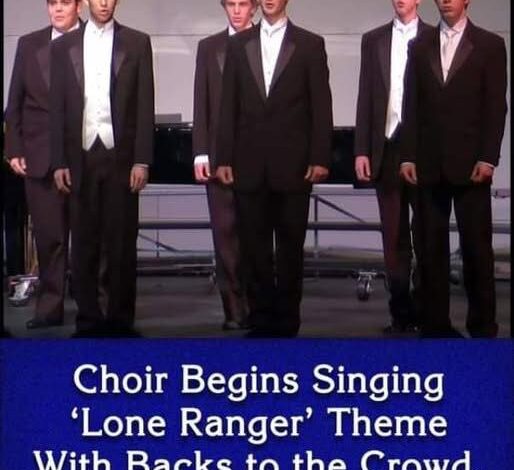When a High School Choir Turned Classical Music into Comedy Gold

There are some performances you expect to see in a school auditorium—classical recitals, carefully practiced choir songs, or polished orchestra pieces. But every now and then, something completely unexpected takes place that not only entertains but also leaves an imprint on everyone lucky enough to be there.
This was exactly what happened at Timpanogos High School during one of its choir concerts. What started as a typical school performance quickly transformed into a hilarious, uplifting, and unforgettable event that blended musical brilliance with laugh-out-loud comedy. Parents, teachers, friends, and students in the audience found themselves roaring with laughter while simultaneously marveling at the sheer creativity and talent of the choir.
Setting the Stage: A Night of Anticipation
It was like any other school concert night. Families gathered in the auditorium, chatting quietly as they found their seats. The room carried that special mix of excitement and nerves common before student performances. Parents adjusted their cameras and phones, ready to record the moment their child walked on stage. Teachers, many of whom had coached these students for weeks, were prepared for a pleasant evening of music.
The lights dimmed, the whispers hushed, and all eyes turned to the stage as the Timpanogos High School choir filed in. Dressed neatly and standing in organized rows, they looked ready for a traditional choral performance. The audience expected harmonized classics or perhaps a modern arrangement of a familiar tune. What they got instead was something far more unique.
Choosing the Unexpected: The Lone Ranger Theme
The students had decided to tackle the William Tell Overture, a classical piece composed by Gioachino Rossini in 1829. While the overture itself is lengthy and complex, its finale is instantly recognizable as the theme song for The Lone Ranger, a character who galloped into American pop culture as a masked hero of justice.
Normally, this energetic piece is performed by a full orchestra, complete with strings, brass, woodwinds, and percussion to capture its galloping rhythm. But the Timpanogos choir made a bold decision: they would perform the piece a cappella, using only their voices to replicate the iconic sound.
At first, the audience was impressed simply by the technical skill. Performing Rossini’s fast-paced, intricate melodies without instruments is no small feat. Listeners smiled politely, admiring the students’ dedication and vocal precision. It could have ended there—an ambitious and successful performance of a difficult composition. But the choir had something more in store.
The Moment of Surprise: Turning Their Backs
As the music grew livelier, an unusual shift occurred. One by one, members of the choir turned around so that their backs faced the audience. Confusion rippled through the room. Parents exchanged glances. Was this a mistake? Had someone missed a cue?
Then, the audience noticed one student who remained facing forward, her expression playful and mischievous. Slowly, laughter began to spread. This was no mistake. It was part of the act.
The choir had staged what looked like a blunder, only to reveal it was deliberate. By breaking the audience’s expectations, they sparked the first wave of laughter. It was a clever piece of comedic timing, carefully rehearsed to catch everyone off guard.
The auditorium, moments before hushed and respectful, now rang with giggles and amused whispers. The students had hooked their audience, and they weren’t about to let go.
Comedy and Music Hand in Hand
What followed was a performance unlike any traditional choral recital. The students leaned fully into the humor, using exaggerated facial expressions, silly spins, and unexpected gestures to add layers of comedy to their singing. Some choir members mirrored one another like reflections in a funhouse mirror. Others flipped back to face the audience at unpredictable times, creating moments of surprise that sent fresh waves of laughter rolling across the room.
It was as if the choir had turned Rossini’s famous overture into a living cartoon. The galloping rhythm of the music became the soundtrack for playful antics, and every joke was elevated by the precision of the singing.
What made the performance truly impressive was that the comedy never distracted from the music. The students’ harmonies remained tight, their timing impeccable. The humor wasn’t an escape from the challenge of the piece—it was woven seamlessly into it, showing both their musical discipline and their creativity.
Laughter Takes Over the Auditorium
By now, the entire audience was completely swept up in the fun. Parents clutched their sides, laughing until their cheeks hurt. Students in the crowd shouted encouragement, clapping and cheering for their peers on stage. Even teachers, who had likely expected a dignified classical performance, were laughing freely along with everyone else.
The performance became more than entertainment—it was a shared experience of joy. Every audience member, young or old, felt connected in that moment, laughing together at the students’ ingenuity.
The atmosphere in the auditorium was electric. What had begun as a polite concert transformed into a full-blown celebration of talent and humor, proving that music doesn’t have to be serious to be meaningful.
The Big Finish
As the choir reached the finale of the William Tell Overture, the energy soared. Their voices raced through the familiar melody, imitating the pounding hooves of galloping horses. The comedy continued right to the end, keeping the audience in stitches while maintaining perfect musical form.
Then came the final note. Silence hung in the air for a split second—followed by thunderous applause. The entire audience rose to their feet in a standing ovation, clapping, cheering, and whistling as if they had just witnessed a professional Broadway act.
The students beamed, soaking in the well-deserved recognition. They had managed to turn a high school choir performance into something extraordinary, something no one in that auditorium would forget.